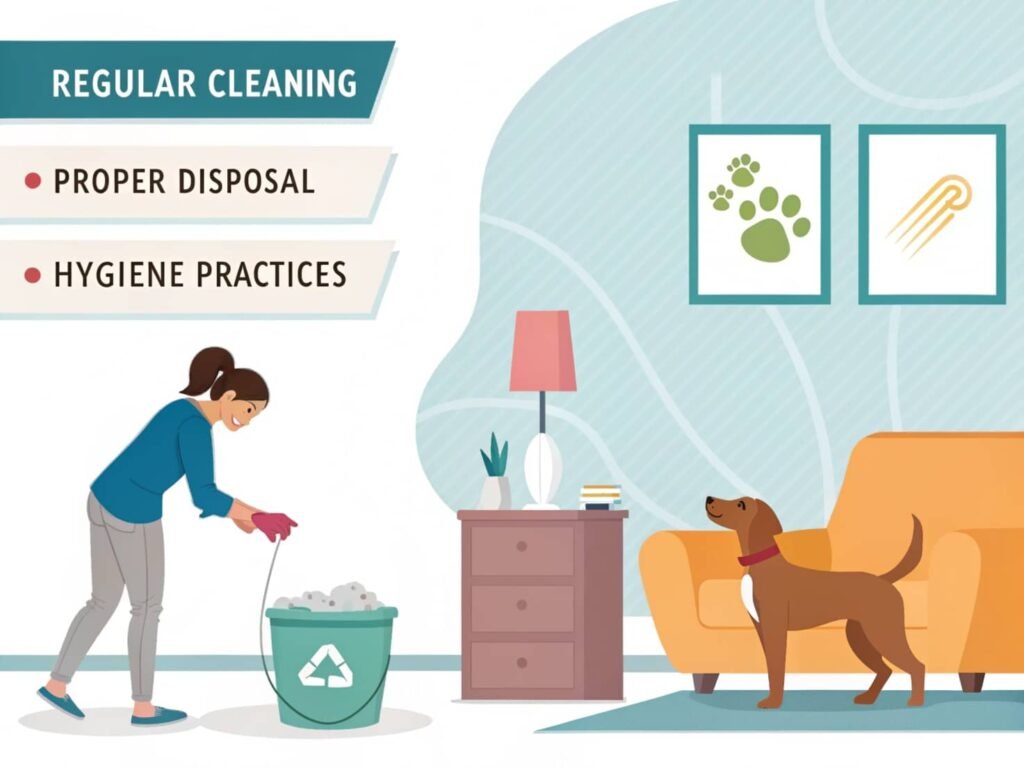Dog owners often underestimate the potential dangers of pet poop when they walk their dogs in parks, neighborhoods, or yards. Dog poop not only makes us disgusted, but also affects our health.
This article explores the dangers of dog poop, how to effectively dispose of it to prevent environmental contamination, and how to stop the spread of parasites in your home.

Why Dog Poop Is Harmful to Humans
Dog poop is not fertilizer. It contains a high concentration of harmful bacteria, viruses, and parasites that can survive for weeks in the environment.
Unlike cow manure, dog feces can contain:
- E. coli
- Salmonella
- Campylobacter
- Roundworms (Toxocara canis)
- Giardia
Many of these microorganisms are zoonotic, meaning they can transfer from dogs to humans.
Diseases Humans Can Get from Dog Poop
Dog poop can be a vector for multiple diseases, especially if not disposed of properly. Here are the most common illnesses:
1. Toxocariasis
Caused by roundworms found in dog feces. If ingested, larvae can migrate to the liver, lungs, eyes, and brain—especially dangerous for children.
2. Giardiasis
A parasitic infection causing diarrhea, stomach cramps, and nausea. Spread by direct contact with contaminated poop or water.
3. Salmonella & E. coli
Bacteria found in feces that can cause fever, vomiting, and dehydration. Particularly risky for pregnant women, the elderly, and people with weak immune systems.
4. Campylobacteriosis
A common bacterial infection causing abdominal pain and fever. It spreads through contact with contaminated feces.
Environmental Impacts
Dog poop is a significant pollutant. It contains nitrogen and phosphorus, which can enter waterways and cause harmful algal blooms, deplete oxygen, and kill aquatic life. It can also carry pathogens into water bodies, contaminating drinking water sources and recreational water. In addition, dog poop releases gases such as methane and ammonia, which contribute to air pollution.
How Does Dog Poop Spread Germs to Humans?
- Stepping in feces and bringing it indoors
- Children playing in contaminated soil
- Fecal matter washing into water systems
- Unwashed hands after picking up waste
- Indirect contact via shoes, tools, or pet paws
Is Dog Poop Harmful to the Environment?
Yes—dog waste pollutes both soil and water systems. Rain can wash poop into storm drains, contaminating lakes, rivers, and groundwater with bacteria and nitrogen. This can lead to algae blooms and kill aquatic life.
Dog poop is not biodegradable in the way you might expect. It doesn't break down safely on its own.
Is Dog Poop More Dangerous for Children and Pregnant Women?
Yes. Young children often touch their faces or mouths after playing outside, increasing the risk of ingesting pathogens. Pregnant women should also be cautious, as some infections can affect fetal development.

How to Effectively Handle Dog Poop to Prevent Environmental Pollution
Proper disposal of dog waste is crucial to protect public health and the environment. Here are effective methods:
Timely and Proper Collection
- Always pick up dog poop immediately during walks or in your yard to prevent contamination of soil and water.
- Use biodegradable poop bags to reduce plastic waste. These bags break down more quickly and lessen environmental impact.
Disposal Options
- Trash Disposal: Seal the waste in a bag and dispose of it in the trash. This prevents pathogens from entering soil and water.
- Flushing: Some municipalities allow flushing dog waste down the toilet, where it is treated in sewage plants, effectively killing pathogens.
- Pet Waste Disposal Systems: Innovative in-ground disposal systems use enzymes and bacteria to break down dog waste into harmless liquid absorbed by soil. Such systems have been successfully implemented in parks and can be installed at home.
Composting Dog Waste
- Composting dog poop can be environmentally friendly but requires careful management to eliminate pathogens.
- Effective composting involves mixing dog waste with carbon-rich materials like sawdust, maintaining high temperatures (above 55°C) for several weeks to kill parasites and bacteria, and turning the pile regularly.
- Home composting should never be used on edible gardens to avoid contamination.
- Industrial composting facilities are better equipped to safely process dog waste and are increasingly available in some cities.
Community and Personal Responsibility
- Participate in or organize community “poop patrols” to keep public spaces clean.
- Educate dog owners on the importance of waste cleanup to reduce environmental and health risks

How Preventing Parasite Spread from Dog Poop in the Home
Regular Deworming and Veterinary Care
- Have your dog tested for parasites at least once or twice a year, more frequently for puppies.
- Follow a regular deworming schedule prescribed by your veterinarian to reduce parasite shedding.
Immediate Cleanup and Sanitation
- Pick up and dispose of dog feces promptly to prevent re-infection and environmental contamination.
- Designate a specific potty area in your yard and clean it regularly using pet-safe disinfectants to kill parasite eggs.
- Use diatomaceous earth (DE) or other recommended treatments on outdoor potty areas to reduce parasite survival.
Home Hygiene Practices
- Wash pet bedding, toys, food and water bowls in hot water regularly to kill parasites and eggs.
- Steam clean carpets, furniture, and drapes if your dog has been in those areas to eliminate parasite eggs.
- Sterilize floors, kennels, and other surfaces with strong disinfectants safe for pets, such as Lysol or bleach solutions.
- Teach children not to eat dirt or put hands in their mouths after playing outside.
Personal Hygiene
- Always wash hands thoroughly with soap and water after handling pets, their waste, or contaminated soil.
- Use gloves and masks if you are particularly sensitive or cleaning large amounts of dog waste.
Preventing Environmental Exposure
- Prevent your dog from eating feces or scavenging in areas where other animals may have defecated.
- Avoid walking your dog in areas known to be contaminated with feces or where parasite prevalence is high
FAQ
Can you get sick from touching dog poop?
Yes. Dog feces can carry parasites and bacteria. Always wash hands thoroughly.
Is dog poop worse than human poop?
In some ways, yes. Dog feces are more likely to contain parasitic eggs like Toxocara.
What should I do if I step in dog poop?
Remove the contaminated shoes, clean thoroughly with soap, and disinfect.
Conclusion
Dog poop is more than just an unpleasant sight; it is a vector for disease and environmental pollution. Proper management through timely cleanup, responsible disposal, and preventive veterinary care can drastically reduce the risks posed by dog feces.





